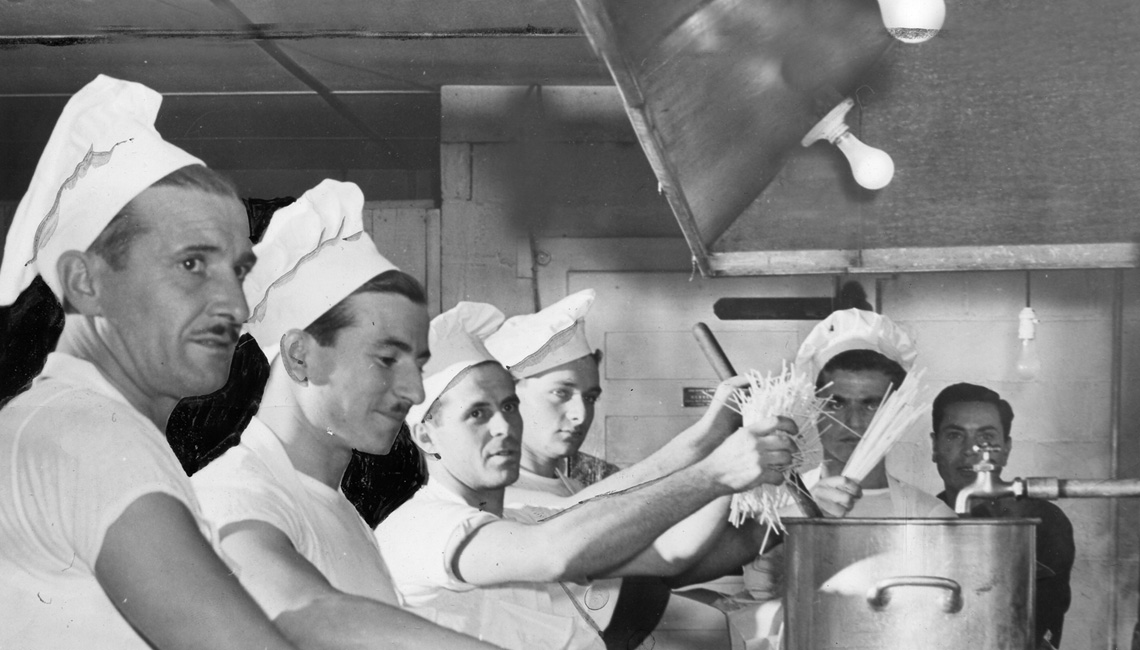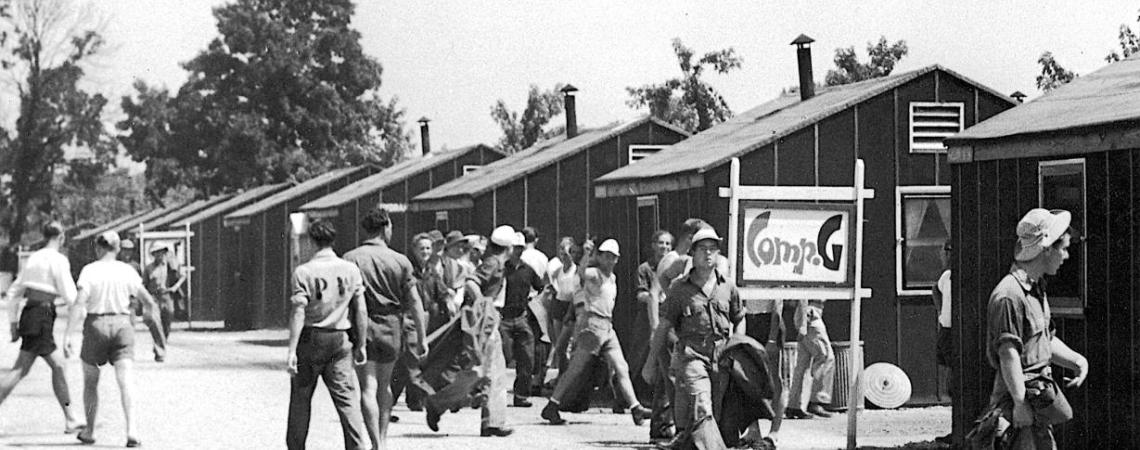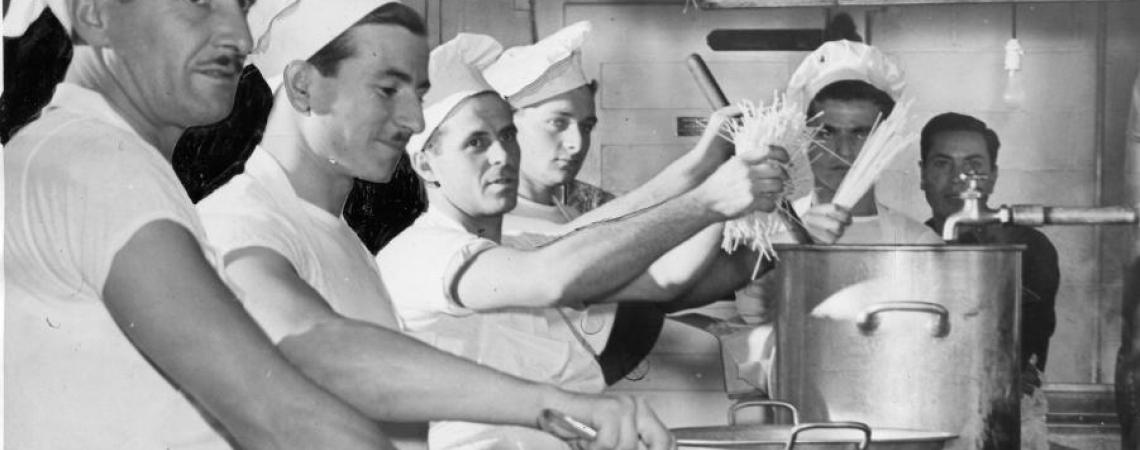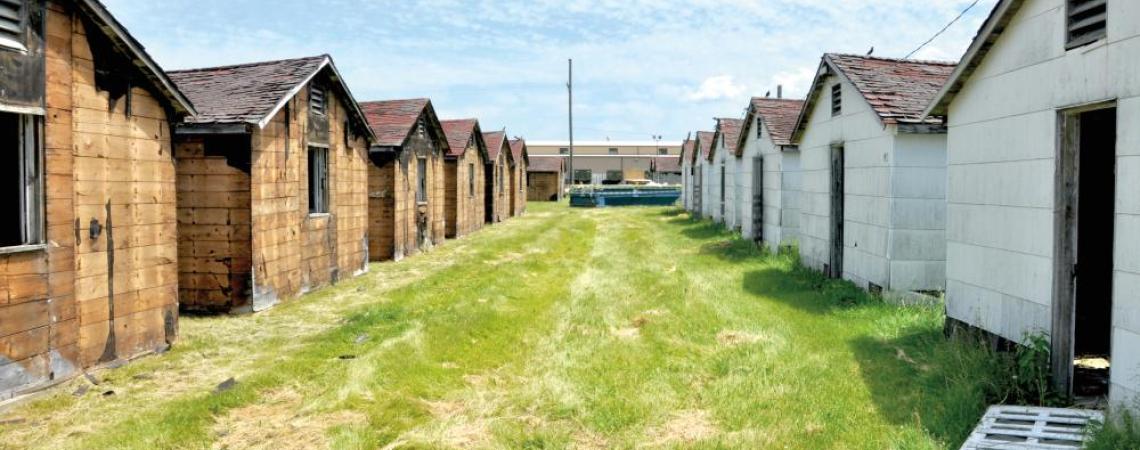Camp Perry, on the Ohio shores of western Lake Erie a few miles west of Port Clinton, boasts the second-largest outdoor rifle range in the country. The facility has hosted the National Rifle and Pistol Matches — drawing competitors from around the world to the “world series of shooting sports” — for more than a century.
But few people today realize that for several years during the mid-1940s Camp Perry served a different purpose: It was a major prisoner-of-war camp, housing some 6,000 German and Italian prisoners in America’s heartland. Today, three-quarters of a century after the last POW marched out of Camp Perry, there is still much tangible evidence of that era remaining, thanks to ongoing historic preservation efforts. For instance, the brick buildings known as “Commercial Row” that house firearms vendor displays during the National Matches once served as mess halls for the POWs during World War II.
Impressed at how they were treated, many of the German and Italian prisoners who were held at Camp Perry returned to live in the U.S. after the war.
The United States maintained nearly 700 camps, in all but three states, during the war — established to help alleviate the overcrowding of POWs housed in Great Britain. Had just Italian (50,273) and Japanese (3,915) POWs been sent to the U.S., existing American camps could have handled those numbers. But late in the war, as Allied troops began to take control, an additional 371,683 German prisoners began debarking from troop ships onto America’s shores, and the POW prison system was quickly overwhelmed. U.S. military leaders scrambled to find suitable camp locations and construct facilities, and also to train guards, interpreters, and other support personnel; it was a monumental task.
Camp Perry was designated as a main POW base camp in September of 1943; smaller branch camps were located in or near Columbus, Bowling Green, Defiance, Marion, and Wilmington, as well as in Fort Wayne, Indiana. Italian soldiers captured on European battlefields began arriving at Camp Perry right away, followed by German soldiers in 1944. The prisoners were housed in small, wood-framed, tar-paper-covered 16-by-16-foot buildings, groupings of which were called hutments. Each building was a single story constructed on a concrete slab, double-walled with double-pane windows, heated by a wood-burning stove. Five prisoners were assigned per building. Eleven guard towers and nine-strand barbed-wire fence 9 feet high enclosed the entire encampment.
Prisoners were required to work while at the camp. (Officers were exempt, but many chose to work to alleviate the boredom of prison life.) Prisoners performed the daily routine maintenance of the many buildings, cooked, cleaned, and did other chores as needed. As a result, they earned a small number of coupons per day that they could then redeem at the prison camp PX, or Post Exchange.
According to numerous accounts, German prisoners did not think much of the American 3.2% alcohol beer they could purchase at the camp PX for 10 cents per bottle — it was just too bland and mild for their tastes. However, they did like the Coca-Cola that sold for 4 cents, and they bought many a pack of Spuds cigarettes, which cost 14 cents.
POWs were also often pressed into service outside the camp, which was not always popular with local civilians.
POWs even worked at two Ohio hospitals, Crile General in Parma and Fletcher General in Cambridge. Others served as farmhands in northwest Ohio or worked in factories alongside American civilian women whose husbands and sons were fighting overseas. The Americans also watched as the prisoners were provided three square meals a day — often eating food that citizens couldn’t readily obtain because meats and canned goods were subject to strict rationing.
Some local civilians took the food disparity issue, and the fact that they had a POW camp in their backyard, philosophically, and even went out of their way to interact with the prisoners, while others refused to have anything to do with them. One Ohio resident, who chose to get to know some of the men “behind the wire” at Camp Perry, commented, “You could tell the Germans from the Italians because the Italians were laid-back and so friendly, while the Germans were stoic, stern, and did not talk much, although they worked hard.”
After May 8, 1945, V-E Day, which marked the end of World War II in Europe, American POW camps began to empty almost immediately as prisoners were sent home to their native countries.
Interestingly, a number of German and Italian prisoners eventually returned to America to live permanently and even become citizens. Impressed by how relatively well they were treated as POWs, they wanted to experience the opportunities and freedoms they had seen while in America that their home countries did not offer.
‘Escape wasn’t much of a concern’
 During the time Camp Perry housed prisoners of war during the Second World War, some POWs worked off-site — employed at area businesses, or planting and harvesting crops at local farms. Of course, they were overseen by armed camp guards.
During the time Camp Perry housed prisoners of war during the Second World War, some POWs worked off-site — employed at area businesses, or planting and harvesting crops at local farms. Of course, they were overseen by armed camp guards.
Well, at least most of the time.
Kenny Libben (pictured), curator of the Cleo Redd Fisher Museum in Loudonville, relates a story handed down from his grandfather:
“My family owns a farm adjacent to Camp Perry, and during WWII, our farm included a large commercial orchard.
“My grandfather, who was a young boy at the time, told me stories about the POWs: how they would be marched from the camp to the farm to help pick fruit during harvest and surprisingly just left there. The guards would drop them off in the morning and then go back to the camp for the day, leaving my grandpa and great-grandpa to keep an eye on them. He said the POWs always behaved well, so escape wasn’t much of a concern, but one day the guards forgot to come back to get them.
“My family ended up feeding all the men supper, and eventually my grandfather had to go to the camp to remind the guards that there were a few dozen Nazis sitting in our front yard and would someone please come get them.”












